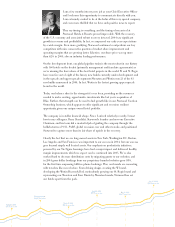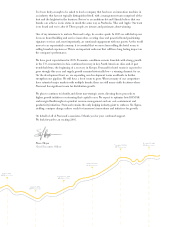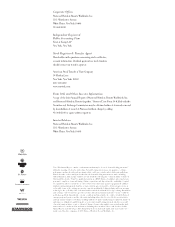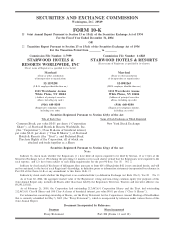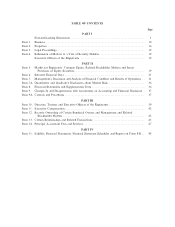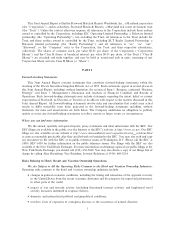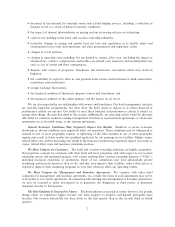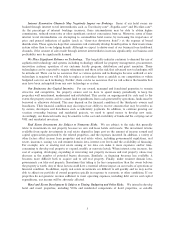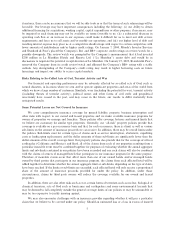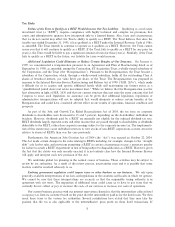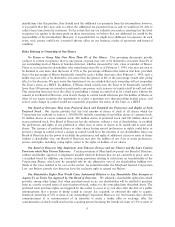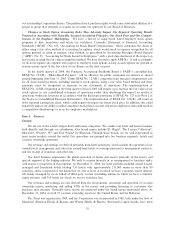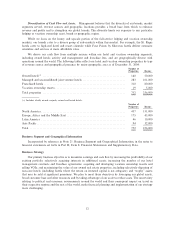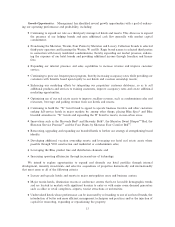Starwood 2004 Annual Report Download - page 11
Download and view the complete annual report
Please find page 11 of the 2004 Starwood annual report below. You can navigate through the pages in the report by either clicking on the pages listed below, or by using the keyword search tool below to find specific information within the annual report.Internet Reservation Channels May Negatively Impact our Bookings. Some of our hotel rooms are
booked through internet travel intermediaries such as Travelocity.com», Expedia.com» and Priceline.com».
As the percentage of internet bookings increases, these intermediaries may be able to obtain higher
commissions, reduced room rates or other signiÑcant contract concessions from us. Moreover, some of these
internet travel intermediaries are attempting to commoditize hotel rooms, by increasing the importance of
price and general indicators of quality (such as ""three-star downtown hotel'') at the expense of brand
identiÑcation. These agencies hope that consumers will eventually develop brand loyalties to their reservations
system rather than to our lodging brands. Although we expect to derive most of our business from traditional
channels, if the amount of sales made through internet intermediaries increases signiÑcantly, our business and
proÑtability may be signiÑcantly harmed.
We Place SigniÑcant Reliance on Technology. The hospitality industry continues to demand the use of
sophisticated technology and systems including technology utilized for property management, procurement,
reservation systems, operation of our customer loyalty program, distribution and guest amenities. These
technologies can be expected to require reÑnements and there is the risk that advanced new technologies will
be introduced. There can be no assurance that as various systems and technologies become outdated or new
technology is required we will be able to replace or introduce them as quickly as our competition or within
budgeted costs for such technology. Further, there can be no assurance that we will achieve the beneÑts that
may have been anticipated from any new technology or system.
Our Businesses Are Capital Intensive. For our owned, managed and franchised properties to remain
attractive and competitive, the property owners and we have to spend money periodically to keep the
properties well maintained, modernized and refurbished. This creates an ongoing need for cash and, to the
extent the property owners and we cannot fund expenditures from cash generated by operations, funds must be
borrowed or otherwise obtained. This may depend on the Ñnancial condition of the third-party owners and
franchisees. Their Ñnancial condition may also impact our ability to recover amounts that may be owed to us
by owners, developers and franchisees such as indemnity payments. In addition, to continue growing our
vacation ownership business and residential projects, we need to spend money to develop new units.
Accordingly, our Ñnancial results may be sensitive to the cost and availability of funds and the carrying cost of
VOI and residential inventory.
Real Estate Investments Are Subject to Numerous Risks. We are subject to the risks that generally
relate to investments in real property because we own and lease hotels and resorts. The investment returns
available from equity investments in real estate depend in large part on the amount of income earned and
capital appreciation generated by the related properties, and the expenses incurred. In addition, a variety of
other factors aÅect income from properties and real estate values, including governmental regulations, real
estate, insurance, zoning, tax and eminent domain laws, interest rate levels and the availability of Ñnancing.
For example, new or existing real estate zoning or tax laws can make it more expensive and/or time-
consuming to develop real property or expand, modify or renovate hotels. When interest rates increase, the
cost of acquiring, developing, expanding or renovating real property increases and real property values may
decrease as the number of potential buyers decreases. Similarly, as Ñnancing becomes less available, it
becomes more diÇcult both to acquire and to sell real property. Finally, under eminent domain laws,
governments can take real property. Sometimes this taking is for less compensation than the owner believes
the property is worth. Any of these factors could have a material adverse impact on our results of operations or
Ñnancial condition. In addition, equity real estate investments are diÇcult to sell quickly and we may not be
able to adjust our portfolio of owned properties quickly in response to economic or other conditions. If our
properties do not generate revenue suÇcient to meet operating expenses, including debt service and capital
expenditures, our income will be adversely aÅected.
Hotel and Resort Development Is Subject to Timing, Budgeting and Other Risks. We intend to develop
hotel and resort properties, including VOIs and residential components of hotel properties, as suitable
3



